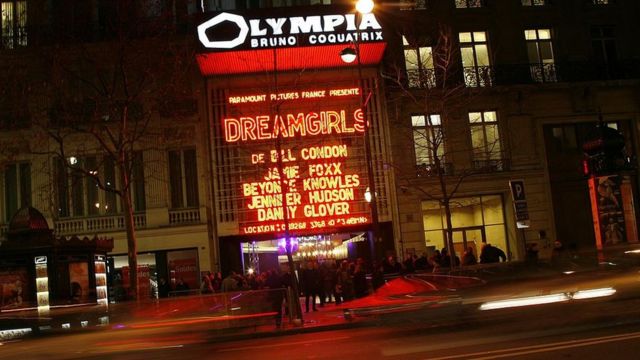“There was a time when we were competing with Michael Jackson for who was selling the most records in France.”
–
The phrase is not pretentious: in 1983 a cumbia composed by the Peruvian Walter León Aguilar called “Colegiala” sold more than a million copies in France.
–
And she earned a gold record for it, on par with other big names in the music industry.
–
A Peruvian composer, a famous Colombian singer and a Swiss multinational have to do with this story.
–
And the climax took place in the legendary Olympia theater in Paris, in the same theater that Edith Piaf, “the nightingale of France”, packed in the 1960s. Twenty years later, thousands of French people were crying out for “Schoolgirl”.
–
“In that first presentation we sang it like nine times. We played it, they followed two more of our repertoire and then we repeated it “, Juan Carlos Díez, musical director of the orchestra La Tipica RA7, tells BBC Mundo.
–
The group was then called “Rodolfo Aicardi y su Typica RA7”, including the name of the singer who would make “Colegiala” famous throughout Latin America, in France, Italy and Spain.
–
SOURCE DISCS
–
–
Rodolfo y su Típica RA7 continued to perform the song until Aicardi’s death in 2007.
–
–
“It is very difficult to know why people liked it so much, because most French people did not know what the lyrics said, but there was a time when we were competing with famous artists like Michael Jackson for who sold the most singles in France” , explains Diez.
–
Now “Colegiala” is one of the songs most listened to during Christmas time in Colombia, but where did the song originate and How did it come to Europe to become a resounding success?
–
From Peru to Olympia
In 1975, Walter León Aguilar, leader of the Peruvian musical group Los Ilusionistas, came up with the idea of composing a song about a young man who falls in love with a schoolgirl.
–
The song became popular and began to tour various countries. In 1980 the echo reached Colombia, where a decade of tropical music explosion was ending.
–
One of its greatest exponents was Rodolfo Aicardi, a singer famous for several popular music hits such as “Cariñito”, “Adonay” and “The piece of paperWhite“, who sought to break down gender barriers.
–
And on that road he met “Colegiala”.
–
“Rodolfo loved to search for songs. He was a great interpreter and that is why he was constantly searching for songs not only in Colombia, but in South America,” Diego Londoño, author of the book “Rodolfo Aicardi, the history of ‘”the idol of always”.
–
At that time, Díez was working as a musician in the Aicardi orchestra.
–
End of YouTube content, 1
–
–
–
–
It was then that an urgent request came to him: record the song in the shortest time possible.
–
“We recorded it in one afternoon. What they told us is that it had to be on the radio before the Peruvians made it famous,” Díez recalls.
–
“The next day the first copies were pressed and ready to distributeI know“he adds.
–
The Colombian version, with the incorporation of instruments such as timbales and trumpets, was released in the middle of that year and was a success from day one.
–
So much so that it was included in the main compilations that were released for the Christmas and New Year holidays.
–
This is how it became a December classic in Colombia, something that still lasts.
–
“One thing those songs had (like the one on” Colegiala “) is that everyone listened to them, old and young. And as time goes by, many people are gone and their friends and family remember them listening to these songs”, Londoño points out.
–
“And what is the most nostalgic time of the year? December. Christmas,” he adds.
–
Crossing the puddle
Although most of Aicardi’s songs were hits, “Colegiala” reached another level, crossing borders and continents.
–
“Unlike what happens now, that to duplicate a song is done with two keys on a computer, before if you wanted to make a copy of the song you had to ask the record company,” says Díez.
–
Over time, Aicardi, Díez, and the other musicians in the orchestra began to notice that requests for copies were coming to the record company that had recorded the song from Ecuador, Peru, Chile, Spain, Italy, France …
–
How had they gotten this far?
–
Commercial with a train
It was 1982 and an advertising agency was commissioned with a campaign for the instant coffee brand of a renowned multinational. It was, initially, aimed at consumers in Ecuador.
–
The song chosen for the commercial was “Colegiala”. It sounded in the background as a steam-powered train passed through several coffee-growing towns.
–
“The publicists came to Colombia to record various parts of that commercial. And while they were resting after filming, they listened ‘Schoolgirl‘and they decided that it was the perfect subject for the publicity “, relates Londoño.
–
 –
–
GETTY IMAGES
–
–
The Olympia theater in Paris where Rodolfo and his Typica RA7 performed.
–
–
It turned out that the commercial was a success in Ecuador. Later in Peru. Later in Chile. And all for the song.
–
In Chile, the artist Miguelo even performed it at the popular 1986 Viña del Mar Festival.
–
“One day they tell Rodolfo that they are going to give him a gold record for millionaire sales in France, who is going to play at the mythical Olympia theater in Paris “, Díez recalls.
–
It turns out that, in addition to the 30-second commercials for French television, the advertising agency had produced a version of almost five minutes that was shown in theaters in Paris, right before the films.
–
There the song sounded complete. Spectators in Parisian theaters had the melody recorded by dint of hearing it in an instant coffee commercial.
–
“It was supposed to be just one night at the Olympia. We were going to receive the gold record and give a concert, but it ended up being three. And it was sold out,” says Diez.
–
One of those nights, they alternated with Charles Aznavour, the singer-songwriter known as the “ambassador of the song“French.
–
“We repeated it nine times per function, and I think its success was due to a mixture of rhythm and that special way that Rodolfo had of singing his songs,” he says.
–
“He didn’t sing. He told you what the lyrics of the song said.”
–
“Colegiala” not only stayed in Spanish: among the many versions that are known, one in Italian by Fausto Papetti and another by Sandra Reemer, a singer from the Netherlands, stand out.
–
Aicardi died in 2007 due to health complications, but the Typica RA7 continued to function, especially due to “Colegiala”, the emblem item they consider as their “cédula” (identity document).
–
“SI always carried a cassette with the track of ‘Colegiala’ for the shows he did as a soloist. And when they asked him to show the identity card to identify himself, he joked and said: ‘The one with a photo or the one without?’, In reference to the song, “says Diez.
–
“And since then ‘Colegiala’ has been the identity card of our orchestra, our way of identifying ourselves”, concludes the musical director.
–
– .


